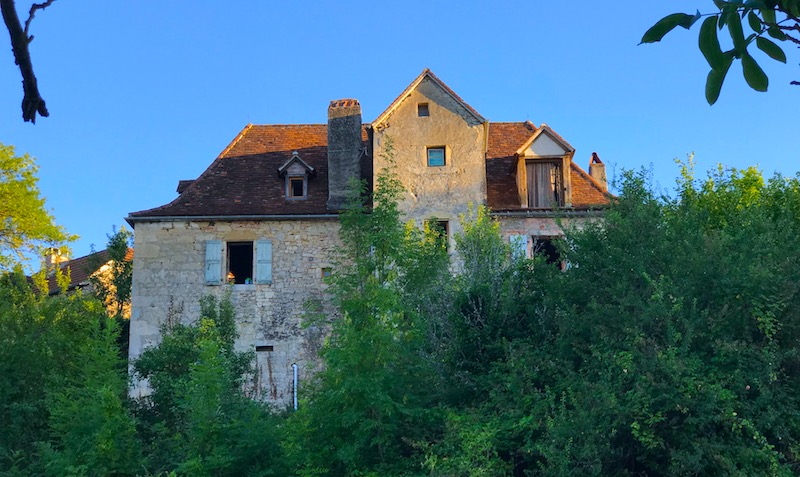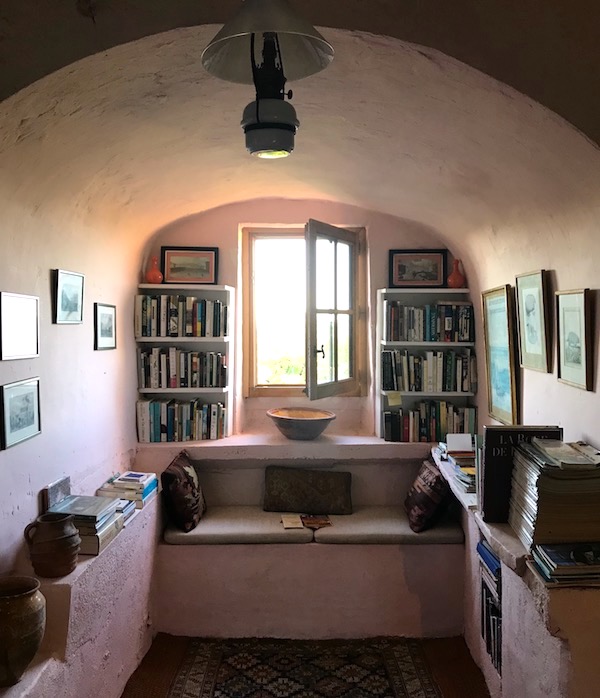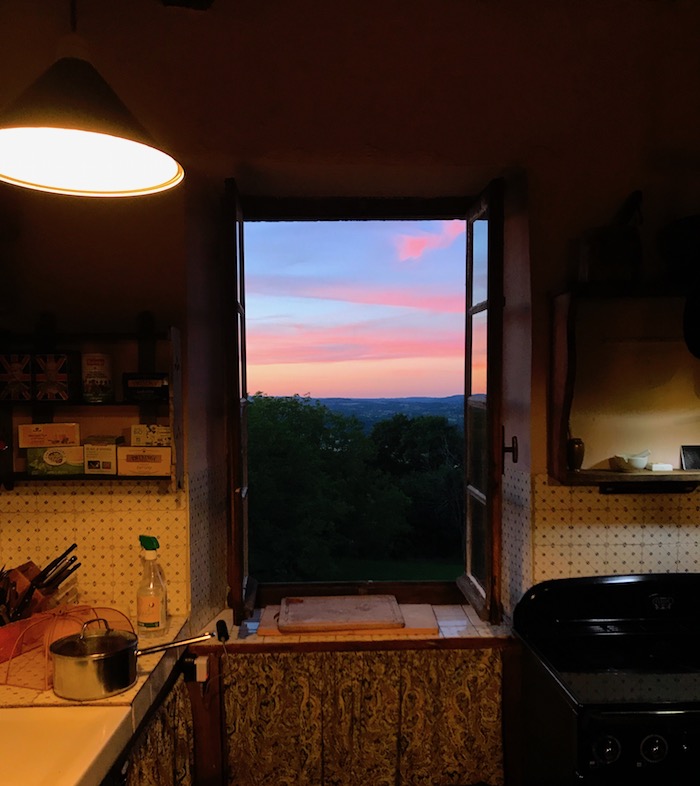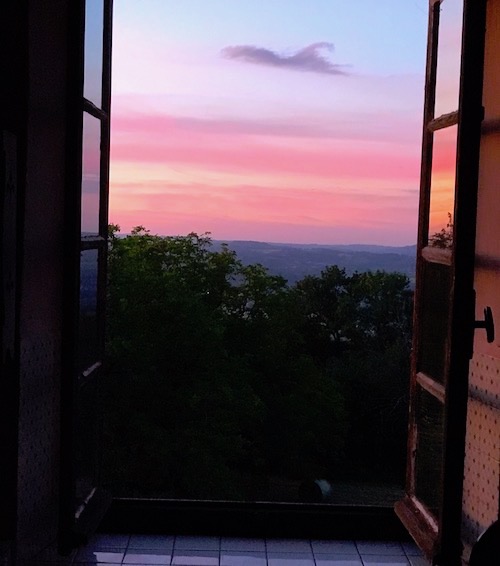“There is nothing for you to say. You must
First learn to listen. Because it is dead
It will not come to you of itself, nor would you
Of yourself master it. You must therefore
Learn to be still when it is imparted,
And, though you may not yet understand, to remember.”
–WS Merwin
*
Nearly 70 years ago WS Merwin, the two-time Pulitzer Prize-winning poet and translator, was exploring the south of France when he came across a derelict stone farmhouse in the Midi Pyrenees region between Toulouse and Bordeaux. The rustic building, which was being used for drying tobacco, caught his attention less for its condition than for its location perched high above the Dordogne river, with views to the north and west across the broad valley below. This building and its surroundings would significantly influence his writing—and by extension much of American poetry—for decades to come. The life he started building here offers a model of an alternative literary life perhaps unavailable now.
Over the past several years I’ve been incredibly fortunate to spend time at this home, moving for days among its artifacts and old buildings, its gardens, wandering pastures and paths. I’m distrustful of nostalgia—especially when it comes to poetry—so I don’t intend to add to such narratives here, but I am interested in one individual’s dedication to isolation and solitude as a way to shape art.
In the New York Times, Merwin’s now-deceased wife Paula once described William as “a strange combination of recluse and very convivial.” The man I’ve known for 25 years has strictly guarded his privacy, so I’m left to imagine Merwin maturing into his voice and vision while living here among farmers, shepherds and old ruins, while learning to grow his own food and flowers, while translating and writing and learning from the locals.
Hidden from the road, the house has a view of vast farmlands below, with the river meandering among scattered houses and chateaux. Castle ruins, medieval town squares, and Stone age dolmens and grottoes are all within walking distance. His house sits on several acres stitched by stone walls and cart paths, some reportedly dating back to Roman times. From here Merwin wrote and read in full view of the lessons of history while listening for the roots of language and poetry. It is quiet here, and interruptions are rare: the nearest neighbors are his two donkeys who, apart from feeding time, silently win any staring contest. It is a sacred place that rewards careful contemplation and silence.
 Merwin’s house in the evening light. (All subsequent photos by the author.)
Merwin’s house in the evening light. (All subsequent photos by the author.)
Most of my days here are spent reading, writing, and searching for baguettes before the boulangeries in town sell out of their daily allotment, or with opening the right windows at the right times as the hot sun moves across the sky, to keep this old house cool. Against the withering daily news, I come here for the joy of simple things—baskets of food from the farmers markets, cheese, wine, lizards slinking in from the terrace to bask on a sunlit rug, summer downpours, a mouse that wanders in the open door, masonry that has survived hundreds of years, a cool breeze in a star-filled night.
Here I’ve reread most of Merwin’s poetry several times over and have bunked down in a bedroom where visiting writers like Ted Hughes and Sylvia Plath slept; I’ve daydreamed in the shadow of the writing studio where Merwin wrote some of the most significant poetry collections of the 20th century, most notably, The Lice and The Carrier of Ladders. It’s particularly meaningful to read those books with his manual typewriters lurking on a nearby shelf. One can imagine the poet habitually working on his poems, first out in the garden writing with pencil nibs on pocket scraps, before coming into his studio where he would corral scraps into typewritten lines:
what is it
they say can turn even this into wisdom
and what is wisdom if it is not
now
in the loss that has not left this place
oh if we knew
if we knew what we needed if we even knew
the stars would look to us to guide them
The house itself is well-loved, especially by the critters: swallows lurk in the chinks of thick stone walls; an occasional bat hangs from heavy beams. Their silent aboding gives this place an animist spirit: antique cooking utensils wait in the fireplace; donkey carts, farm tools and red clay roofing tiles hide in dark barns; old paintings and botanical drawings enliven the interior walls; rose bushes, lindens and fruit trees scent the private gardens. In the distance hulking castles, dating back to The Hundred Years War, dominate the hillsides. At any moment a neighbor herds his sheep down an old lane much as others have done for hundreds of years, leading his livestock down this same path that bisects Merwin’s property en route to other stony paths connecting time and the surrounding landscape. There is no pretentious frippery to the history on display—nature is imagination at constant work, history is now.
While the history of persistence, conflict, and change is evident outside the house, the habits of a lifetime remain within the house and gardens. Although Merwin can no longer travel from his home on Maui, his studio looks as it did when he was last here five years ago: a coat thrown over the back of a chair, awaiting his return; an electric footwarmer resting on the stone floor underneath his simple wooden desk; a couple pairs of shoes are lined up underneath a small napping cot; wooden clogs on a shelf await spring rain and mud; a small shrine with incense-ash, wax drippings and small animal skulls suggest a ritual to writing; scraps of firewood stacked outside the door are ready to light up the beautiful three-chamber, cast-iron woodstove hauled here from Norway; his desk is tidily organized in expectation of the next time, when he might pull one of the typewriters off the shelf. Despite the age and decay, this place is teeming with life.
I’m left to imagine Merwin maturing into his voice and vision while living here among farmers, shepherds and old ruins, while learning to grow his own food and flowers, while translating and writing and learning from the locals.In his memoir-cum-travelogue, The Mays of Ventadorn, Merwin briefly mentions discovering this place, buried in brambles along a potholed road outside of Loubressac. He was in his twenties at the time, in fresh possession of a BA from Princeton, recently divorced, and exploring France shortly after WWII. He tells the story of his initial visit to the Chateau de Ventadour, sent there at the urging of his much older friend Ezra Pound, who had himself explored the area.
During Merwin’s final years at Princeton, his roommate was Galway Kinnell and his best friend was James Merrill (whom he affectionately calls “Jimmy”). All were determined to become poets and studied with John Berryman and R.P. Blackmur, while reading classic literatures. Over one school break Merwin visited St. Elizabeth’s Hospital in Washington, DC, on a whim hoping to meet Pound, who was institutionalized there. WWII was at its end when the two started their friendship, and an isolated Pound enjoyed visitors. As Merwin explains, Pound had “an unchecked love of giving advice” to young poets. It was a different type of apprenticeship program in those days, and there was no Google. At the time, Merwin had admired Pound’s poetry and immersive knowledge of classics, so he listened carefully to the elder’s advice.
 The pantry-turned-library.
The pantry-turned-library.
I can’t imagine myself pulling up a stool next to someone so politically unpalatable, much less following his advice to explore foreign farmlands. I find it hard to imagine a young poet today visiting an older, mansplaining, anti-Semite. Yet during Merwin’s college years Pound’s reputation was being rehabilitated by his publisher and young “Ezrologists.” His professor, John Berryman had visited Pound, so Merwin did the same, whereupon Pound gave him advice that shaped his voice and guided who he would become as a writer.
Even while he was “reluctant to admit” Pound’s distressing tendencies, Merwin wrote that “he was convinced that they did not render the rest of his writing worthless and pernicious.” Pound was in “the bughouse” while Merwin had himself been sent to a psych ward for a year because of his own conscientious objection and pacifism. After the visit the elder poet sent Merwin brief, cryptic postcards with instructions such as “read seeds, not twigs.” He encouraged Merwin toward translation as a path to becoming a better writer, directing him to study the troubadours and Dante as a key to understanding the Western lyrical tradition. Pound suggested that the troubadour poems of langue d’òc—a neglected Romance language, also known as Occitan—would help him learn his own language if he tried to get his translations as close to the originals as possible. Despite Pound’s overbearing passion, Merwin found much value in this advice, and became one of our most accomplished translators.
![]()
I will take with me the emptiness of my hands
What you do not have you find everywhere
A decade before buying his home in France, Merwin had entered Princeton at the age of 16 on a scholarship, the rebellious son of parents who never went to college. His father was a Depression-era Presbyterian minister who was of limited means compared to the families of Merwin’s wealthy college classmates. At age 17, toward the end of WWII Merwin left Princeton to enlist in the Navy, and almost immediately realized his mistake, soon announcing himself as a conscientious objector. This change of mind earned him a year in the psychiatric ward of Chelsea Naval Hospital. He would return to Princeton a year later, and dove deep into poetry.
Intensely frugal, Merwin provided for himself by working as a waiter at Princeton while relying upon hand me downs and secondhand goods. Near the end of his time at Princeton he married Dorothy Jeanne Ferry, a Princeton secretary, and after graduation he left on a steamship for Europe, where he’d gotten a gig as tutor for the children of a member of the Portuguese royal family. This was followed by a job tutoring the children of Robert Graves. After his relationship with Graves exploded—reportedly over an argument the two had after Graves sexually harassed a female visitor—Merwin left Mallorca, heading for France.
Less than a decade after World War II, Merwin found himself divorced, drifting around Europe on foot, on scooter, and by car. When the house caught his attention, he befriended locals who directed him to seek out the owner, a woman who lived in the nearby town of Miers. Peeking through the windows, he could see light coming through the floors, and signs of animals living inside. Alongside its accompanying barns, stables and dovecote, it had been sitting empty for a long time, but the owner was unwilling to sell it to speculators. He offered her $800 and with a handshake agreement made a commitment to live there and make it his home.
There is a window at Loubressac, in the kitchen, that I pause at throughout the day: every morning at sunrise, and while preparing meals or making tea, then at night while doing dishes, it calls forth contemplation and epiphanies.He returned later to repair its rotten floors and broken roof tiles, gradually remodeling it. It had no bathroom and no modern kitchen at the time—just an outhouse, a traditional larder and two walk-in fireplace hearths, one of which was used for cooking. An additional building that would become his writing studio, once housed the community’s wood-fired bread oven. Merwin built a terrace and improved the water catchment/filtration system, raised donkeys, nurtured a walled garden, converted the original bedroom to a full kitchen, made a library of the original larder, installed a woodstove and boiler for heating, and converted the attic into bedrooms and a tiny bathroom. Beyond the handshake promise, he persisted with daily practice.
 Evening light in the kitchen.
Evening light in the kitchen.
Around this same time his first book was chosen by WH Auden for the Yale Younger Award. He also remarried. Dido Milroy was a wealthy British socialite and literary figure whom he’d met when she was a Graves houseguest. She was 15 years Merwin’s senior and was well connected. Dido helped him land a job with the BBC, where he was hired to translate El Cantar del Mio Cid, as he bounced back and forth between France and London and Boston, where he’d received a fellowship to work on a play with The Poet’s Theater. Dido became engaged in his literary dealings and apparently was not only influential, but controlling. (Merwin has claimed that her previous husband once told him that Dido “had always wanted to own a poet.”) It seems that she was very protective, often shooing unexpected visitors away from the house, so that he could write. She was also intensely jealous of some of his friends, including Hughes and Plath, who were regular guests at the home.
While her protection gave Merwin the space necessary to write uninterrupted, it was likely difficult for a poet who from an early age had demanded his independence. (Years later, as this marriage was falling apart, Merwin went so far as to find Dido another house of her own—a nearby place called La Barrade that is at the center of his short story “Shepherds.”) Despite the marital tension, the house was for years his refuge and primary residence. He explored the hilly region on a well-used scooter and was often seen with one of his donkeys, wandering the stone paths throughout the region. (Once during a general strike when school buses stopped running, Merwin went around the village with a donkey cart, ferrying kids to school.) Merwin wanted to learn how to live purposefully and intentionally on the land—a practice he would later transfer to his home on Maui.
During the 1960s, his marriage was falling apart at the same time that his generation was demanding social justice, civil rights, and an end to the US war in Vietnam. As if reflecting the shared dismay, Merwin’s writing started to change dramatically. In the publication of The Moving Target (1963), the first glimpses of what would become his signature style begin to emerge: enjambment and the interruption of syntax become more prominent in his poems, majusculation and sentences start to disappear as meaning shifts toward the indefinite. His poems become similar to the farm paths around the countryside: without clear ownership or destination as walls dissolve around them and they reach out in multiple uncertain directions.
The change would be complete with his most influential and stylistically groundbreaking book, The Lice (1967), which would be published four years later. It represents a noticeable break from fashion, as well as from his own highly regarded earlier work. On the cover page of the book’s original typescript manuscript, the title is typed as The Glass Tower. Merwin crossed that title out by hand, and penciled in The Lice, along with a Heraclitus quote. As notable as this edit is, the manuscript title page is equally engaging for its return address: Lacan de Loubressac. With this book he was announcing his home.
The world was falling apart around him, he was distanced from family, his friend Plath had killed herself, riots were erupting in the US and France, self-immolations and police beatings shocked the news cycle, and like today people were wondering what the fuck was going on.Before its publication there was no book of its type in American poetry. The Lice, with its stylistic shifts, is a product of place. Most readers will note how Merwin dropped all punctuation from his poems at this time—a signature of most of his later writing. That simple gesture suggests the unpunctuated songs of the troubadours and oral tradition, yet Merwin alternately offered that punctuation “stapled the poem to the page.” This gesture wasn’t an affectation to make the writing seem more “poemy.” It was a formal decision to influence how a mind moved through the poems. The result is a floating, breathy quality, wherein punctuation is not marking time and syntactical meaning can shift unsteadily. Whereas his early work drew upon myth and legend, this simple gesture made his poems myth-like and oracular, with their rage and tension seething just below the bleak, almost rocky surface.
The world was falling apart around him, he was distanced from family, his friend Plath had killed herself, American was again bombing a poor country, riots were erupting in the US and France, self-immolations and police beatings shocked the news cycle, and like today people were wondering what the fuck was going on. And all this while he was living in a work-in-progress house in the middle of nowhere.
 Merwin’s barn.
Merwin’s barn.
Unfortunately, during the past couple of years, it’s been too easy to imagine how Merwin must have felt during some of these most productive and tumultuous years. Looking off across the Dordogne, quietly meandering toward the Atlantic Ocean, there’s a moral urgency that overwhelms one’s thoughts now just as it must have commanded Merwin’s attention then, as he wrestled with his country’s racism and bloodlust—and his own place in it. He wanted to do something. He came here not to get away, but to learn how to honestly participate in a troubled world, to learn how to be a poet, to learn how to “put life back into the world.” Or as he writes in Summer Doorways, “I would have the luck to discover, to glimpse, to touch for a moment some ancient, measureless way of living, of being in the world, some fabric long taken for granted, never finished yet complete, at once fixed and evanescent as a work of art, an entire age just before it was gone.”
A year after publishing The Lice Merwin and Dido separated, and for the next ten years, the house was divided, too. She was reluctant to leave the house, nor grant a divorce, and so he began to explore the world once again, living for a spell in Mexico, sharing a small sublet apartment in New York City, traveling to Hawaii to study Buddhism with Robert Aitken, and returning to Loubressac whenever he could—occasionally staying at La Barrade while Dido lived down the road in his home. His life, too, had seemingly become unpunctuated.
![]()
All men are deceived by the appearances of things, even
Homer himself, who was the wisest man in Greece; for
he was deceived by boys catching lice: they said to him,
“What we have caught and what we have killed we have
left behind, but what has escaped us we bring with us.”
–Heraclitus
And so starts The Lice. The Lice is a fairly bleak book, but it would be a mistake to read it as just a book responding to the war or a failing marriage. This collection doesn’t have the sort of great love poems that appear in Merwin’s later books, but it does introduce his growing environmental consciousness. His poems don’t engage the rhetoric of political speech or personal attack—but rather anger and remorse seem to hover just under the surface of the poems’ understated making.
He would demonstrate a greater outspokenness when his following book, The Carrier of Ladders, earned him his first Pulitzer, and he famously split his prize money between draft resistance efforts and Alan Blanchard, a protestor who had been blinded by a police beating. But the poems remained fabular and strange, seemingly tethered to the earth while also drifting above it. They express dissatisfaction, clearly and without blinking, and are by turns sardonic, incredulous: “There is no season / that requires us,” he writes in “The Widow” and “everything that does not need you is real.” The world and its dying trees and critters do not need us, yet years after writing those existential lines, as we approach point of no return, Merwin plants trees and scribbles lines.
There is a window at Loubressac, in the kitchen, that I pause at throughout the day: every morning at sunrise, and while preparing meals or making tea, then at night while doing dishes, it calls forth contemplation and epiphanies. Near his studio, it has a view similar to what Merwin must have nurtured while writing. The world out there proclaims itself to be living and surviving as it has for centuries. This window looks out across a pasture and a grove of walnut trees, down the bluff toward the Dordogne and the hamlets of Prudhomat and Biars-sur-Cere. Sticking my head out this favorite window, to the left I can see the pointed witch-hat towers of two neighbors’ homes—the sort of medieval dovecotes common to this region. To the right is a forest of several acres.
 The kitchen window looking west.
The kitchen window looking west.
Over the years, whenever Merwin would win an award or come to earn some money, he would buy a little more land to protect it from development, so that now, through years of reading fees, frugal discipline, commitment and practice, he has preserved acreage and legacy. And yet it doesn’t feel owned like property in the US—he is more of a participant in a tradition than he is an owner. Below and beyond the kitchen window, looking into a walnut grove, I have seen foxes exploring the pasture skittishly. Or a neighbor again drives his sheep up the lane to the path through Merwin’s property. I have watched ferrets plucking plums from the trees around the house, have listened to livestock being fed out of sight in a barn down the hill. At night the town lights go out bit by bit. Everyone is temporary. The stars come out and the breeze stirs. What he has made here is a gift which insists on a future based on the past, as he has put life back into the world.
*
The Room
I think all this is somewhere in myself
the cold room unlit before dawn
containing a stillness such as attends death
and from a corner the sounds of a small bird trying
from time to time to fly a few beats in the dark
you would say it was dying it is immortal
![]()

The preceding is from the Freeman’s channel at Literary Hub, which features excerpts from the print editions of Freeman’s, along with supplementary writing from contributors past, present and future. The latest issue of Freeman’s, a special edition gathered around the theme of power, featuring work by Margaret Atwood, Elif Shafak, Eula Biss, Aleksandar Hemon and Aminatta Forna, among others, is available now.



